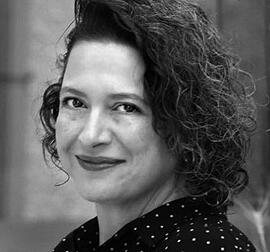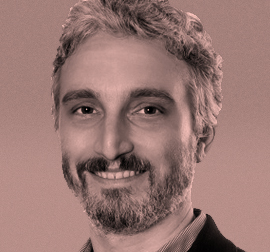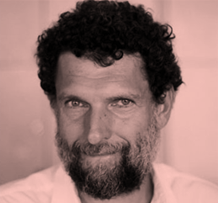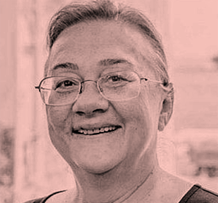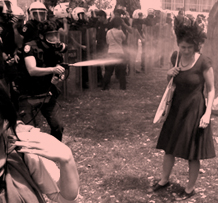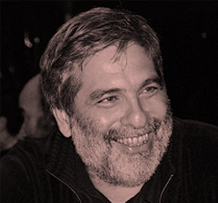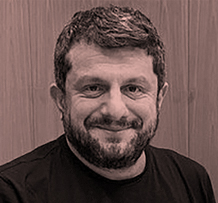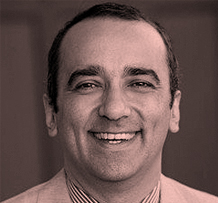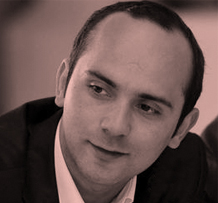Like Can Candan, filmmaker, producer, and journalist Çiğdem Mater uses the language of art for defending rights. She has been involved in the making of many award-winning films and documentaries. She worked as the coordinator for the Anadolu Kültür Caucasus programs, the Boğaziçi University Mithat Alam Film Center, and the Turkey coordinator of the Armenia-Turkey Cinema Platform. Mater returned to Turkey from Germany for the sentencing hearing of the Gezi Trial. She was sentenced to 18 years in prison and arrested on the grounds that she was a flight risk.
Çiğdem Mater has been active in the fields of media and cinema since 1997. She has worked on film projects about human rights. She has worked as the executive producer on international projects including Ai Weiwei’s Human Flow and Ben Attia’s Weldi.
She was the coordinator of Anadolu Kültür’s Caucasus programs between the years 2005-2009. Later, she became the coordinator of Boğaziçi University Mithat Alam Film Center for a year. She was also the Turkey coordinator for the Armenia-Turkey Cinema Platform.
On Friday, November 16th, 2018, 13 people were detained in operations held against civil society workers and academicians. Working as a consultant for Anadolu Kültür at the time, Çiğdem Mater was among these detainees. Others included Yiğit Ali Ekmekçi, Yiğit Aksakoğlu, Hakan Altınay, and Mine Özerden - all who would later be tried at the Gezi Trial with Mater. Mater was released after her interrogation under the condition of judicial control and with a ban on leaving the country.
In its statement on the operation, the Istanbul Police Department claimed that Osman Kavala organized and financed the Gezi protests through the Open Society Foundation (Açık Toplum Vakfı) and Anadolu Kültür. Included in the allegations were “organizing a meeting at DEPO owned by Anadolu Kültür AŞ with the aim of deepening and popularizing the Gezi Park events”, “bringing from abroad professional activists, educators and facilitators of activism in order to maintain the continuation of the Gezi Park events under the headings of Civil Disobedience and Nonviolent Protest”, “aiming to set the agenda for the continuation of the Gezi Park process and possible Gezi-like events through their own media by engaging in acts of forming new media”.
The investigation, which included evidence collected by prosecutor Muammer Akkaş wanted for Fethullah Terrorist Organization (FETÖ) / Democratic Union Party of Syria (PYD) membership, came to an and in 2019. On February 19th, 2019, the Istanbul Public Prosecutor’s Office announced that the indictment filed after the investigation of the Gezi Park protests was sent to the 30th High Criminal Court of Istanbul. On March 4th, 2019, the 30th High Criminal Court of Istanbul accepted the indictment it had received. In the 657-page-long indictment, 16 people including businessperson Osman Kavala - imprisoned since November 1st, 2017 - and four others detained - one later arrested - on November 2018 (Çiğdem Mater Utku, Ali Hakan Altınay, Yiğit Aksakoğlu, Yiğit Ali Ekmekçi) were asked to serve aggravated life sentences on the allegations of “attempting to overthrow the Turkish Republic Government and to partly or wholly prevent the government from performing its duties.”
The first hearing of the trial took place at the 30th High Criminal Court of Istanbul on the 24th and 25th of June 2019. In the hearing where nine defendants plead their case, the court ruled for the discharge of Yiğit Aksakoğlu on the condition of judicial control, and the continued arrest of Osman Kavala.
The Prosecutor’s opinion announced on February 6th, 2020, demanded:
- To differentiate from the file the prosecution of Ayşe Pınar Alabora, Can Dündar, Gökçe Yılmaz, Handan Meltem Arıkan, Hanzade Hikmet Germiyanoğlu, Memet Ali Alabora and İnanç Ekmekçi and wait for the execution of their warrant for arrest,
- To penalize Osman Kavala, Yiğit Aksakoğlu, and Mücella Yapıcı for the crime of “attempting to overthrow the Turkish Republic Government and to partly or wholly prevent the government from performing its duties by using force and violence” per article 312 of the Turkish Penal Code (KCK),
- To penalize Çiğdem Mater, Ali Hakan Altınay, Mine Özerden, Can Atalay, Tayfun Kahraman, and Yiğit Ali Ekmekçi under article 39 of the Turkish Penal Code (KCK) for acting as aids in “the attempt to overthrow the Turkish Republic Government and to partly or wholly prevent the government from performing its duties by using force and violence” per article 312 of the Turkish Penal Code (KCK).
8 defendants including Osman Kavala were acquitted on the 6th hearing of the trial which took place on February 18th, 2020.
On January 22nd, 2021, the 3rd Criminal Division of the Istanbul Regional Court of Justice revoked the verdict of acquittal from the Gezi Trial. The Division ruled to deliver the case file to the court of first instance for re-examination and ruling. It was decided that the trial should continue with the procurement of missing evidence. The 36th High Criminal Court of Istanbul that had tried Kavala made the verdict to join the Gezi Trial with the case filed for the crimes of “attempting to remove constitutional order” and “political and military espionage”, in the hearing that took place on February 5th, 2021.
There was another decision to merge trials on April 28th, 2021. The 30th High Criminal Court of Istanbul ruled to rejoin the main case file which included Osman Kavala’s trial with the cases kept separate “because they were abroad” of Can Dündar, Memet Ali Alabora, Ayşe Pınar Alabora, Gökçe Tüylüoğlu, Handan Meltem Arıkan, Hanzade Hikmet Germiyanoğlu and İnanç Ekmekçi on the allegations of “attempting to overthrow the government.”
On July 28th, 2021, the 16th Criminal Division of the Supreme Court revoked the acquittal of 35 defendants including the members of the Beşiktaş Football Club’s supporter group Çarşı. It was approved to join the case in which these defendants were tried for the Gezi protests with the main Gezi Park trial. The Supreme Court wanted to merge the two cases.
In the hearing for the merged trials on October 8th, Kavala’s lawyer Köksal Bayraktar asked for a separation of the case files and that his client be discharged. The prosecutor demanded that Kavala remain under arrest due to the nature and skill of his crime. The court ruled for the continuation of Kavala’s arrest on the basis of there being “strong criminal suspicion and tangible evidence.”
The fifth hearing of the trial took place on February 21st, 2022. The court ruled for the separation of the case files and the continuation of Kavala’s arrest.
On March 4th, 2022, the prosecutor for the hearing demanded aggravated life imprisonment for defendant Osman Kavala on remand, and defendant Mücella Yapıcı pending trial, based on the accusation of “attempting to overthrow the Turkish Republic Government by using force and violence.” Defendants Çiğdem Mater Utku, Ali Hakan Altınay, Mine Özerden, Can Atalay, Tayfun Kahraman, and Yiğit Ali Ekmekçi were asked to receive 15 to 20 years in prison each for “aiding the attempt to overthrow the Turkish Republic Government by using force and violence.”
The sentencing hearing of the trial took place on the 22nd and 25th of April 2022. Çiğdem Mater stated in her defense that she wanted to shoot a film about the Gezi protests, but that she was being tried for a film that did not exist:
“If this indictment were a film scenario, it would have been rejected for its errors in logic, but this shows that life is more fictional than cinema. I reject all accusations and accept my acquittal.”
It was ruled that Osman Kavala - under arrest for 1637 days at the time - serve aggravated life imprisonment without parole on the allegations of attempting to overthrow the government (Turkish Penal Code 312) and that Mücella Yapıcı, Çiğdem Mater, Ali Hakan Altınay, Mine Özerden, Tayfun Kahraman, Can Atalay, and Yiğit Ali Ekmekçi be taken under arrest and serve 18 years in prison each for aiding the attempt to overthrow the government. Yapıcı, Mater, Altınay, Özerden, Kahraman, and Atalay were arrested that day.
The 3rd Penal Chamber of the Istanbul Regional Court of Justice upheld the 18-year prison sentence given to Mater on 28 December 2022, announcing that it found it appropriate.
The Supreme Court of Appeals Chief Public Prosecutor's Office requested that the convictions of Gezi detainees be approved in July 2023. The Chief Public Prosecutor's Office sent the notification regarding the case to the 3rd Criminal Chamber of the Supreme Court of Appeals.
The 3rd Criminal Chamber of the Supreme Court of Appeals decided on the objection regarding the verdicts given against 17 people on September 28, 2023. While it upheld the 18-year prison sentence given to Osman Kavala, Can Atalay, Tayfun Kahraman, Mine Özerden and Çiğdem Mater Utku, it overturned the 18-year prison sentence given to Ali Hakan Altınay, Yiğit Ali Ekmekçi and Mücella Yapıcı.
